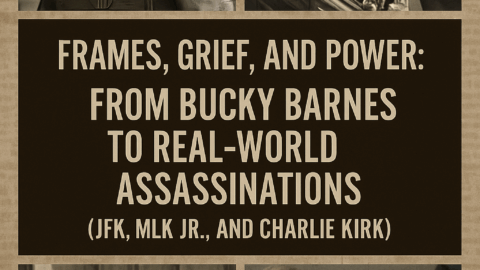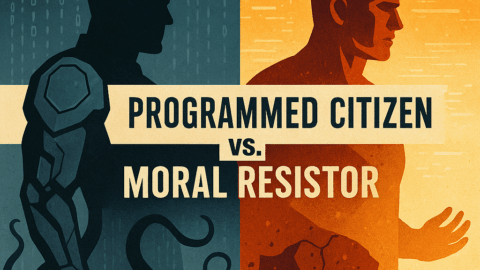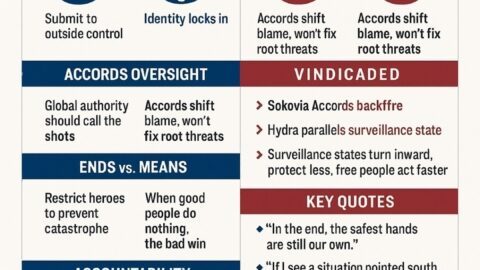I come from a law enforcement background and have family members who are retired and remain active in the field. I am optimistic, but a realist as well. I have high moral expectations for the law enforcement community, that most people would agree with. But we cannot give them carte blanche for everything they do.
Benjamin Franklin said it best, “It is the first responsibility of every citizen to question authority.” Think about it—our country was built on distrust for authority, questioned it and even revolted against the powers to be.
We live in the community, where “Back the Blue” is talked about, and flags are waved around like the American Flag. It is unpatriotic in our community to not “Back the Blue.” It could be construed as pious, or worse.
But we should be skeptical. Which means “inclined to question or doubt accepted opinions.” (1) But we don’t have to go too far and throw the baby out with the bathwater. We just need to keep in mind that, “The first step in solving any problem is recognizing there is one.” (2)
This is not meant to be bashing the law enforcement community, it is meant to give constructive feedback. The law enforcement community prides itself on policing itself and giving them this feedback is meant for the leadership to hold their officers accountable. This is also for the public and elected officials to be aware and mindful of this issue.
So just what is the problem and why should we be skeptical?
In case you didn’t know, the Supreme Court (3) has ruled it to be legal for police officers to lie. “Police have long been prohibited from using physical force during interrogations, but they are still allowed to use a variety of powerful psychological ploys to extract confessions from people.” (4) The “psychological ploys” can be very subtle and missed due to the unknowing and uneducated public. Law enforcement is trained in the art of interrogation with a minimum of required training hours per year, with the option of more specialized training for various positions.
As people become police officers, they learn by being trained and conditioned into the tools of the trade. “Conditioning, in physiology, a behavioral process whereby a response becomes more frequent or more predictable in a given environment as a result of reinforcement, with reinforcement typically being a stimulus or reward for a desired response.” (5) This “desired response” would be an admission of guilt at the expense of the integrity of Law Enforcement.
These are some of the psychological tactics that police and other law enforcement officers use on the unsuspecting public:
- Saying that you are being recorded (either via audio or video) (6)
- Stating they have your DNA or fingerprints (6)
- Offering you a beverage as a way to capture your DNA (6)
- Telling you that you’ve failed a test such as a polygraph or a drug test (6)
- Affirming they have eyewitnesses (6)
- Saying that a victim identified you from a photo (6)
- Stating that an accomplice has confessed (6)
- Warning you that it’s your last chance to tell your side of the story (6)
When these mental head games do not work. The law enforcement community amps up their deception. It is the trick of their craft, as I too was guilty of such deception while I was in the profession.
“Unfortunately, sometimes lies can turn into threats. Police have been known to tell suspects that they will never see their families again if they do not confess or that they are in physical or financial danger if they do not cooperate.” (6)
OUTCOME
In addition, I want to add, “The American system, grounded in the British Common Law, has long erred on the side of protecting innocence. Thus we presume an accused person’s innocence until they are proven guilty. As the preeminent English jurist William Blackstone wrote,”[B]etter that ten guilty persons escape, than that one innocent suffer.”” (7)
If a person is guilty, then be moral and ethical about the case. Do not take a walk around, cheat or be deceptive on getting an admission. Just because it is legal, does not mean it is moral. Might does not make right. The end does not justify the means.
HOW DOES LYING AFFECT THE SYSTEM AND THE OFFICER
In the article, “What Dishonesty Does to Your Brain” (8) explains the physiological affect lying has on people, but in the case, I want to narrow in on the corrupting influence the Supreme Court has on the law enforcement community as a system and to an individual officer.
“Why does lying become easier and easier? Ask your amygdala.” This is exactly what the research discovered.
The researchers wanted to know if “the brain becomes desensitized to dishonesty over time, making it easier to tell a lie when we do so over and over again.” In their experiment, they found “dishonesty snowballed—lies started small but increased steadily in magnitude over time.” While performing the experiment, the team monitored the participants’ “brain activity” by using “functional magnetic resonance imaging (fMRI).”
It was observed early in the amygdala, the participants “felt very bad about the lies they told. But over time, as participants lied again and again, these areas of the brain showed less and less activity.”
The result on the brain, became desensitizing, and transforming as it adapts to the stimuli and “lying no longer stirs up negative feelings, we are able to increase the magnitude of our lies.” There was a correlation in the snowball effect, as the “larger lies further deaden our sensitivity to the act of lying, and the slippery slope continues.”
This is a human problem, not isolated from the law enforcement community. But, when it is integrated by way of the Supreme Court and inserts the green light of lying into the system, it will have a corrupting effect on the culture, society, and subset of the government of We The People. The longer the poison is in the patient, the more problematic and systemic as it corrupts the original American tradition as William Blackstone pointed out, to something un-American.
THE SOLUTION
The article on dishonesty talks about how to keep “yourself and your organization off the slippery slope and on the firm path of honesty.” (8) “Whoever is dishonest in a very little is dishonest also in much” (Luke 16:10).
Mark Meckler said, “If you put bad people into a broken structure, you’re going to get bad results. If you have a bad system and elect good people to go into a bad system, you’re still going to get a bad result.”
We are not electing police officers, but this is applicable across the board from any organization, including government and into our own personal lives. The point, as we can see is lying will taint, infect, and dishonor a profession and person and will have a contagious and transmitting consequence and outcome.
If lying is fundamental, inherent, and inseparable from the law enforcement community, then where do we go from here? “Now you know. And knowing is half the battle” (9).
- Oxford on-line dictionary
- The Newsroom, HBO series
- 1969 Frazier v. Cupp
- Five Facts About Police Deception and Youth You Should Know https://innocenceproject.org/police-deception-lying-interrogations-youth-teenagers/
- Conditioning https://www.britannica.com/science/conditioning
- Are the police allowed to lie in order to get a statement or confession? https://www.macdowelllawgroup.com/faqs/police-officers-can-lie-to-get-a-confession.cfm
- Alexander Volokh, “n Guilty Men,” University of Pennsylvania Law Review 146 (1997): 173-216 https://www.cato.org/policing-in-america/chapter-4/blackstones-ratio#_ftn74
- What Dishonesty Does to Your Brain https://ethicalleadership.nd.edu/news/what-dishonesty-does-to-your-brain-why-lying-becomes-easier-and-easier/
- GI Joe (1980s cartoons with the Public Service Announcement)







